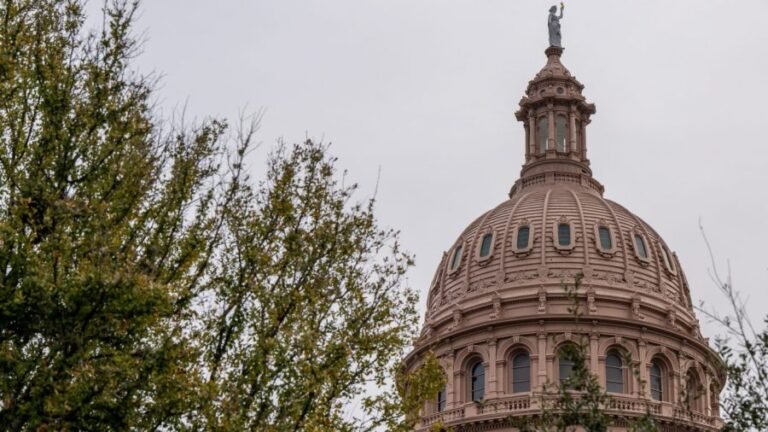
The decision by Texas Democrats to flee the state has ratcheted up tensions and started a new phase in the redistricting war around the country.
Democrats from the Lone Star State’s Legislature fled to Illinois, New York and Massachusetts starting Sunday to avoid giving Republicans the quorum needed to pass a highly unusual effort for partisan, middecade redistricting that could benefit them in next year’s midterms.
In response, Texas Gov. Greg Abbott (R) ordered the arrest of the “delinquent” Democrats, not long after Republicans in the state House passed a motion directing officials to bring them back to the state under warrant.
“Texas House Democrats abandoned their duty to Texans,” Abbott said in a statement Monday afternoon. “By fleeing the state, Texas House Democrats are holding hostage critical legislation to aid flood victims and advance property tax relief. There are consequences for dereliction of duty.”
The rapidly escalating tit for tat underscores how the redistricting battle has turned into an all-out national brawl ahead of what both parties expect to be a fiercely fought midterm election.
“Let’s be clear, this is not just rigging the system in Texas,” Illinois Gov. JB Pritzker (D) told reporters on Sunday, flanked by Texas Democrats. “It’s about rigging the system against the rights of all Americans for years to come.”
The Texas Democrats’ decision to break quorum — or the minimum number of lawmakers needed in order to conduct business in the Legislature — came as Republicans look to advance an even friendly GOP congressional map that could net them five additional seats ahead of next year.
The redistricting move was encouraged by President Trump as Republicans brace for an unfavorable political environment next year — and the possibility of Democratic investigations into his administration if the party loses the House.
Democrats have portrayed the redistricting effort as a naked power grab by Republicans. The current map, authored by a Republican-dominated statehouse in 2021, gives Republicans 65 percent of the state congressional seats — a sizable advantage over the 55 percent of the state electorate who votes for the party.
But if Trump gets the five additional seats he wants, that advantage would expand to 80 percent of the state’s congressional House caucus — a 25 percent advantage secured with no additional need for persuasion.
A Texas House panel advanced the House map last week, teeing it up for a floor vote. With Democrats out of the state, however, the efforts to pass the new map are temporarily stalled.
In addition to the threats of arrest, Abbott also said he would strip lawmakers who failed to return to the state Capitol of their seats. Texas lawmakers already incur a daily $500 fine and threat of arrest for breaking quorum, and Abbott previously threatened them with bribery charges if national Democrats pick up the tab.
“Texans don’t run from a fight — they face it head on,” Abbott wrote on the social platform X. “These Texas Democrats that fled the state are not serving Texans. They are serving themselves. They forfeited their seats and are facing potential felony charges.”
Speaking to reporters in Illinois on Sunday, Texas House Democratic Caucus Chair Gene Wu said they didn’t make the decision lightly to leave the state, but he added that this was “absolutely the right thing to do to protect the people of the state of Texas.”
Democratic leaders from across the country were quick to join in the fight. California Gov. Gavin Newsom (D) has said he’s weighing several options, including through a ballot measure or through the state Legislature, for how to proceed as the Golden State eyes redrawing its own maps in response to Texas.
Pritzker has vowed to protect lawmakers who traveled to his state from the threat of arrest from top Texas leaders.
And while hosting several Texas Democrats in her state on Monday, New York Gov. Kathy Hochul (D) said she will explore different options available to redraw her state’s maps.
“We’re sick and tired of being pushed around when other states don’t have the same aspirations that we always have had, and I hold those dear, but I cannot ignore that the playing field has changed dramatically,” Hochul said. “And shame on us if we ignore that fact and cling tight to the vestiges of the past. That era is over.”
The support from national Democrats, and the threats of arrest, mark a sea change from when Texas Democrats last left the state in response to Republican midcycle redistricting efforts in 2003.
The decision then also occurred in response to a then-unprecedented middecade redistricting push by Republicans, which eventually transformed the state’s congressional delegation from a comfortably Democratic majority to one with 2-to-1 Republican dominance — and locked in the GOP’s generational control over the state Legislature.
The latest Texas battle comes as redistricting has become increasingly normalized by both sides.
When Republicans took the state House for the first time in 2002, they took power despite generations of redistricting by the state’s long-dominant Democratic majority — giving weight to arguments that they deserved their own stab at drawing new lines, Southern Methodist University historian Cal Jillson said.
While Democrats have rebuked Texas GOP leaders for gerrymandering an already Republican-favored House map, the party has also been criticized for doing the same in states like New York and Illinois, both of which have hosted Texas lawmakers.
In fact, a court struck down a map passed by New York Democrats in 2022 over partisan gerrymandering, mandating a court-appointed special master to draw the House lines instead.
The broader redistricting tit for tat has also prompted a reversal among some Democrats around redistricting commissions, which were created with the intent to distance lawmakers from the process of drawing maps.
At the same time, the redistricting battle has also created fissures within the GOP, some of whom are against midcycle redistricting.
Rep. Kevin Kiley (R-Calif.) is introducing legislation that would block new House maps from being implemented ahead of the next U.S. census in 2030, though notably a statement from the California Republican only invoked Newsom.
But the Republican argument that Texas redistricting is their means of addressing what they call an unfair national map marks how much things have changed.
Unlike in 2003, “you can’t make the argument” that Republican redistricting is redressing an unfair map in Texas, Jillson said, because the gerrymandered maps the state GOP is now trying to redraw are ones that state Republicans drew just four years ago. Abbott and the majority of state congressional Republicans opposed redistricting, which they worried would threaten their seats — until Trump applied pressure, The Texas Tribune reported.
Republicans also say there are risks involved if Abbott tries to oust Democrats from their offices.
“So you take them out of office and you have elections, then you still don’t have a quorum. Then you kind of basically shot yourself in the foot,” explained lobbyist and political consultant Bill Miller, who served on state Rep. Tom Craddick’s (R) transition team in 2003, when Craddick was Texas House Speaker — and the architect of that year’s bitter redistricting fight.
“The only thing that I would say from my experience is these wounds that are created by these fights don’t heal easily, and they’re remembered,” he said. “A long time in ways that people forget.”


